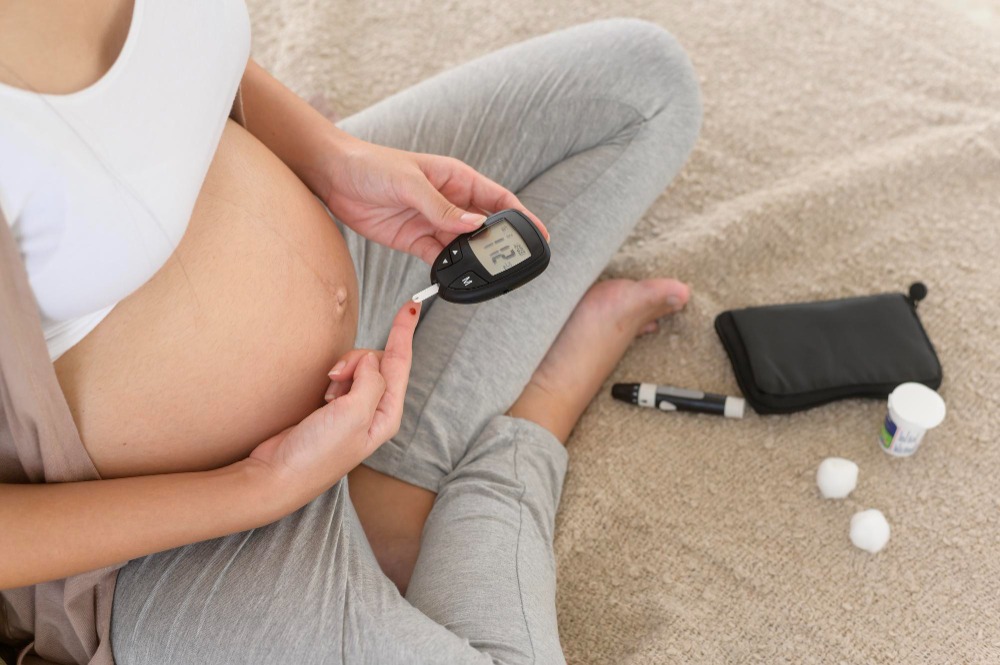Being pregnant is no easy task- swollen feet, random cravings that may sound extreme, body aches that come and go and major hormonal surges. Just hearing about it all can make someone want to sit down and contemplate life. Pregnancy is unfortunately not a piece of cake for most women who end up having to deal with some or the other medical conditions associated with it. Gestational diabetes is one such condition that is caused due to hormonal changes that occur while pregnant. The curious aspect of gestational diabetes is the woman may have never been diabetic before and will go back to normal once she has given birth to the baby.
Gestational Diabetes And Hormones
Now that we know about gestational diabetes, there is one more thing we should be aware of- it places you at a higher risk of suffering from Type 2 diabetes in the future. We don’t exactly know why this happens but research is going on in this regard. Like diabetes, the symptoms may be the same- feeling very thirsty, having elevated blood glucose levels, and needing to drink lots of water. During pregnancy, your body undergoes many changes- one of which is a hormonal one which can render your cells unable to use insulin effectively. Blood glucose levels are typically checked somewhere in the 6-8 months of pregnancy with a glucose tolerance test. This is because insulin resistance begins to set in around that time. You are given a fixed amount of glucose in the form of a drink and then your blood glucose levels are checked a couple hours later with a simple blood test. If the values are on the higher side, your obstetrician may suggest that you be more careful.
Managing Gestational Diabetes With Diet
Pregnancy does not mean having to eat for two like the normal practice goes. You do need more nutrients but that does not mean the amount of food you eat needs to double. It just means you should be smarter about opting for nutrient-rich superfoods while sticking to the same portion sizes as before or as much as is needed. You will anyway be prescribed prenatal vitamins like folate and minerals like iron, calcium, and zinc, so you can continue with them as usual. Dealing with gestational diabetes does not need to be hard- you will just need to be extra careful of what you eat and also make physical activity a daily priority. At times, glucose levels may still not be manageable, at which point you will be prescribed insulin injections for treatment.
Can Gestational Diabetes Be Prevented?
Yes, in most cases if you were overweight before, then you can try to reduce some extra kilos. But if you are pregnant, then you should not try to lose any weight. You should also not be okay with a sedentary routine because movement gets harder. You should aim to exercise through pregnancy too, to reduce your chances of any complications in the end. Gentle exercise routines like stretching and yoga can help in this regard. We don’t understand why, but if you have had gestational diabetes, there is a high chance that your baby could develop metabolic issues later on in life- like obesity or diabetes.
Conclusion
A primary concern during pregnancy is being able to eat nutritious food and retaining reserves throughout, because they will be necessary before, during, and after childbirth too. One thing to remember is gestational diabetes is caused due to hormone changes and in India, especially in urban areas, almost 40% of pregnant women report higher blood glucose levels than usual. Numbers may be higher but many women don’t get screened properly. Uncontrolled diabetes during pregnancy can cause complications like preeclampsia or affect the fetus too, with the need for procedural interventions like a c-section. If you do have gestational diabetes, there is no need to fear. You will get better soon and you should get all the help you need.
FAQs
1) Who is at risk of developing gestational diabetes?
Women who are overweight or have a familial history of dealing with diabetes can develop gestational diabetes in the later parts of their pregnancy.
2) How is gestational diabetes diagnosed?
It is diagnosed with a simple glucose tolerance test, which is typically administered around weeks 32-36 of pregnancy as that is the time when insulin resistance peaks.
3) Is exercise good for dealing with gestational diabetes?
Yes, definitely! It can help you feel better physically while also helping reduce blood glucose levels. It can also improve flexibility and reduce the probability of having to give birth using a C-section.
4) How is the baby affected?
It can lead to babies which may be heavier than usual, which can lead to injuries for the mother. Children may also have hypoglycemia or maybe more attuned to suffering from metabolic disorders in the future.
5) How does a doctor help in managing gestational diabetes?
They can give you medication, suggest which exercises and what kind of physical activity is safest for you. They will also be able to monitor the baby for any negative changes and get you specialised help accordingly.




